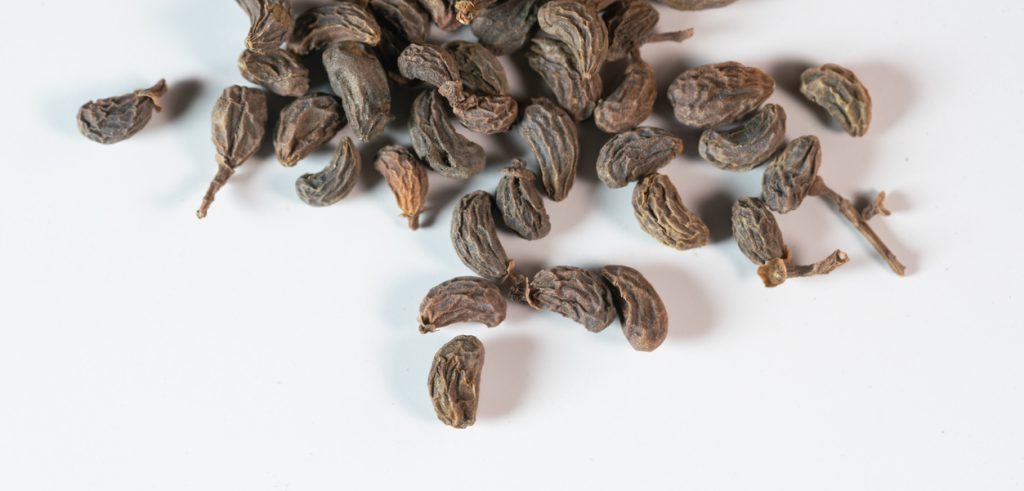Glossy Privet Fruit (Nu Zhen Zi)

Glossy Privet Fruit (Nu Zhen Zi)
Glossy Privet Fruit (nu zhen zi, 女贞子), also known as Fructus Ligustri Lucidi, comes from the plant Ligustrum lucidum, a species of flowering plant in the olive family Oleaceae. Native to China and Eastern Asia, this plant is also used as a form of decoration and source of shade in the United States. This shrub contains large clusters of white flowers and bluish-purple berries that are used medicinally. These berries contain a variety of nutrients, including calcium, fructose, glucose, iron, magnesium and potassium.
Since ancient times, Glossy Privet Fruit has been used as a yin tonic in Traditional Chinese Medicine (TCM). The Chinese name of this herb carries the meaning of “the fruit of a chaste woman”. During the Ming dynasty, Li Shizhen explained in the Compendium of Materia Medica that “The tree keeps verdant (green) even in cold winter, and seems to have the conduct of a chaste woman. Therefore it is named as Nuzhen for its chaste quality.” This herb is usually harvested in the winter when the berries are ripe. The fruits are then slightly boiled and dried under the sun, before being used raw or prepared with wine for medicinal usage.
In Traditional Chinese Medicine (TCM), Glossy Privet Fruit falls under the category of ‘Tonic herbs for Yin Deficiency’. Such herbs are used for patterns of Deficiency to replenish one’s ‘Four Treasures’ (qi, blood, yin, yang). Neutral in nature, Glossy Privet Fruit does not affect the yin-yang balance in your body.
Bitter and sweet in taste, Glossy Privet Fruit can cleanse the body by clearing Heat, drying Dampness and promoting elimination via urination or bowel movements. This herb can also slow down acute reactions and detoxify the body. Glossy Privet Fruit also has a tonic effect on the body by replenishing qi and blood.
Functions and Benefits of Glossy Privet Fruit (Nu Zhen Zi)
Traditional Chinese Medicine (TCM) shows that Glossy Privet Fruit has the following health benefits.
Glossy Privet Fruit can nourish the Liver and Kidneys to address symptoms caused by yin deficiency in the Liver and Kidneys. For example, Glossy Privet Fruit is indicated for symptoms such as dizziness, tinnitus, early whitening of beard and hair, soreness and limpness of lumbar and knees, spermatorrhea, infertility, diabetes, tidal fever, frequent urination and restlessness.
The herb’s ability to treat yin deficiency in the Kidneys also makes it an effective treatment for acne. Before menstruation, yin deficiency in the Kidneys is a source of internal Heat, which then results in acne breakouts. Glossy Privet Fruit can thus relieve this skin condition by nourishing the Kidneys.
Glossy Privet Fruit can also improve sight, and is often indicated for dim and poor vision due to Yin Deficiency in the Liver and Kidneys.
Recent studies conducted in China have also suggested that Glossy Privet Fruit may be able to stimulate the immune system, fight inflammation, protect the Liver, improve vision, and relieve the symptoms of rheumatism and pneumonia. Research has concluded that certain compounds in Glossy Privet Fruit can prevent certain eye disorders, including macular degeneration, and prevent the blurring of vision brought about by ageing and other causative factors.
In addition, Glossy Privet Fruit may be effective in preventing the rapid spread of infection among patients with HIV.

How to Use Glossy Privet Fruit (Nu Zhen Zi)
Glossy Privet Fruit is widely available in dried, crushed and powdered forms. This herb is also available in forms such as tinctures.
The recommended daily dosage of Glossy Privet Fruit is 10 – 15g, when used as a decoction. However, it may be more effective to consume Glossy Privet Fruit in supplement forms such as pill or powder, as oleanolic acid, a key ingredient in Glossy Privet Fruit, is difficult to dissolve in liquid.
Also, do note that steaming Glossy Privet Fruit with millet wine may strengthen its action of nourishing and tonifying the Liver and Kidneys.
Cautions and Side Effects of Glossy Privet Fruit (Nu Zhen Zi)
Glossy Privet Fruit should not be used by individuals who are experiencing Yang Deficiency in the Spleen with Cold and diarrhea.
Some side effects associated with Glossy Privet Fruit include abdominal pain, diarrhea, and runny nose.
We strongly encourage you to consult your healthcare provider before deciding to add Glossy Privet Fruit to your healthcare routine!
Summary
Here is a summary for Glossy Privet Fruit (Nu Zhen Zi):
- Herb name (Chinese): 女贞子
- Herb name (Pin Yin): nǚ zhēn zǐ
- Herb name (English): Glossy Privet Fruit
- Herb name (Botanical): Glossy Privet Fruit
- Origin of species: Ligustrum lucidum Ait.
- Part(s) of herb used: Fruit
- Geo-specific habitat(s): Zhejiang, Jiangsu, Hunan
- Taste(s) & Properties: Sweet, bitter; Cool; Administrates the Liver and Kidney Meridians
- Actions: Ideal for individuals with premature aging symptoms such as early sight deterioration, greying of hair, chronic back discomforts and weak knees.
References
Wang, Z. H., Hsu, C. C., & Yin, M. C. (2009). Antioxidative characteristics of aqueous and ethanol extracts of glossy privet fruit. Food Chemistry, 112(4), 914-918.[Accessed on 12th February 2023]
Weng, W., & Chen, J. (1996). The eastern perspective on functional foods based on traditional Chinese medicine. Nutrition reviews, 54(11), S11. [Accessed on 12th February 2023]
Yin, M. C., & Chan, K. C. (2007). Nonenzymatic antioxidative and antiglycative effects of oleanolic acid and ursolic acid. Journal of agricultural and food chemistry, 55(17), 7177-7181.[Accessed on 12th February 2023]
Share this article on
